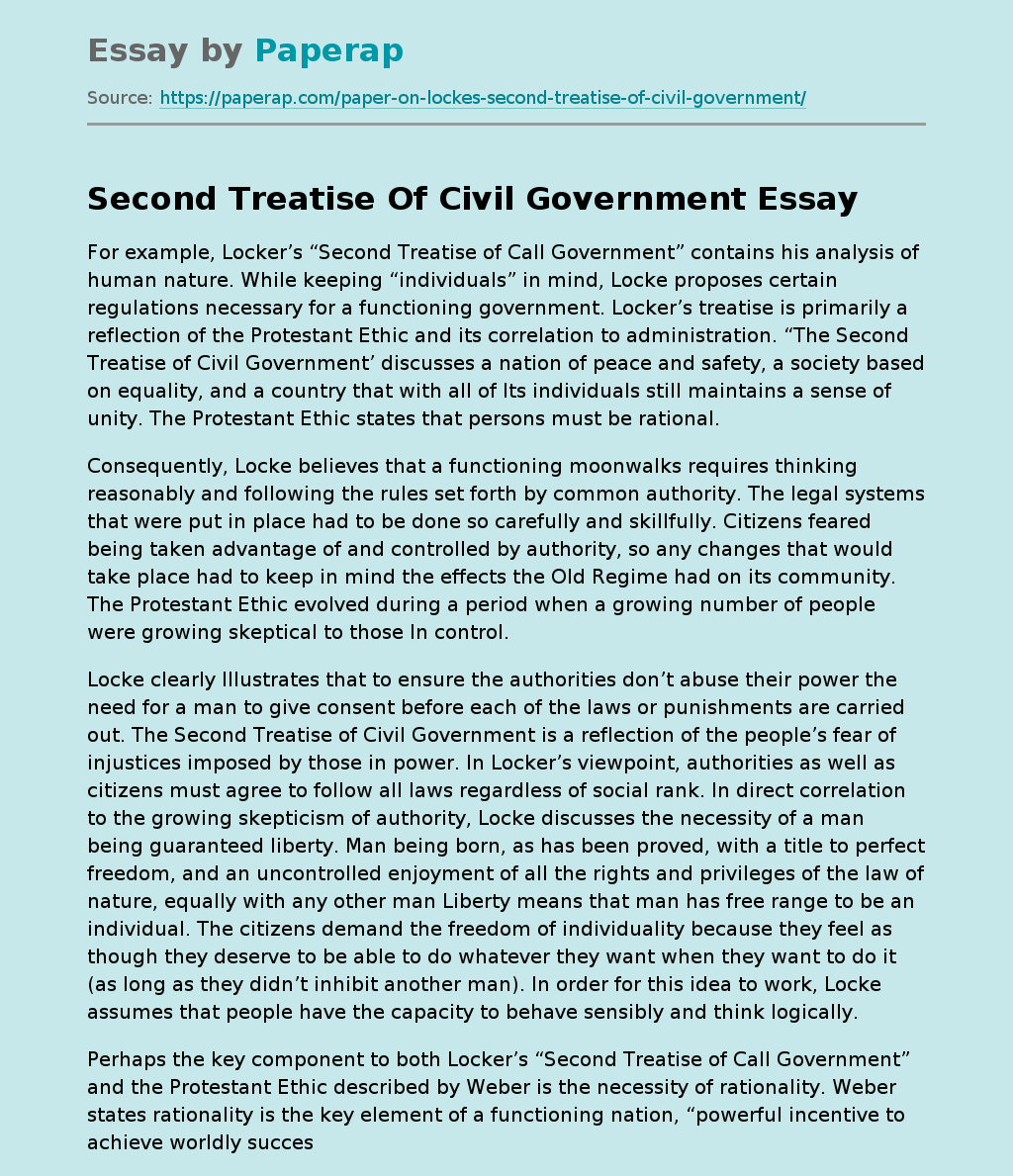Second Treatise Of Civil Government
For example, Locker’s “Second Treatise of Call Government” contains his analysis of human nature. While keeping “individuals” in mind, Locke proposes certain regulations necessary for a functioning government. Locker’s treatise is primarily a reflection of the Protestant Ethic and its correlation to administration. “The Second Treatise of Civil Government’ discusses a nation of peace and safety, a society based on equality, and a country that with all of Its individuals still maintains a sense of unity. The Protestant Ethic states that persons must be rational.
Consequently, Locke believes that a functioning moonwalks requires thinking reasonably and following the rules set forth by common authority. The legal systems that were put in place had to be done so carefully and skillfully. Citizens feared being taken advantage of and controlled by authority, so any changes that would take place had to keep in mind the effects the Old Regime had on its community. The Protestant Ethic evolved during a period when a growing number of people were growing skeptical to those In control.
Locke clearly Illustrates that to ensure the authorities don’t abuse their power the need for a man to give consent before each of the laws or punishments are carried out. The Second Treatise of Civil Government is a reflection of the people’s fear of injustices imposed by those in power. In Locker’s viewpoint, authorities as well as citizens must agree to follow all laws regardless of social rank. In direct correlation to the growing skepticism of authority, Locke discusses the necessity of a man being guaranteed liberty.
Man being born, as has been proved, with a title to perfect freedom, and an uncontrolled enjoyment of all the rights and privileges of the law of nature, equally with any other man Liberty means that man has free range to be an individual. The citizens demand the freedom of individuality because they feel as though they deserve to be able to do whatever they want when they want to do it (as long as they didn’t inhibit another man). In order for this idea to work, Locke assumes that people have the capacity to behave sensibly and think logically.
Perhaps the key component to both Locker’s “Second Treatise of Call Government” and the Protestant Ethic described by Weber is the necessity of rationality. Weber states rationality is the key element of a functioning nation, “powerful incentive to achieve worldly success by carrying out their calling or duty to promote the social welfare”. If people were behaving rationally, they would realize that they had to do whatever it meant as an individual to benefit the group as a whole. In order for social welfare to succeed people need to think logically.
Rationality Is key to the functioning and creation of a tangling commonwealth wader Turner explains Tanat In order Tort a person to live, en or she must be a part of a community. Locke also argues the necessity of people feeling that he or she belongs to a group. As quoted in The Second Treatise, “such a fife as our nature doth desire, a life fit for the dignity of man; therefore to supply those defects and imperfections which are in us, as living single and solely by ourselves, we are naturally induced to seek communion and fellowship with others”. Humans cannot survive alone.
The only way for a person to stay alive is to give consent that they belong to a group. Living as a part of a group requires there be guidelines. These guidelines are imposed as laws to ensure the safety of its citizens. In the preface of his Treatise Locke states, “l suppose no body hereafter will have either the confidence to appear against our common safety. It is this preface that lays the foundation for the remainder of his document, this idea of a society based on the word “common”. Previously in early Europe a commoner was to be regarded as a place in society one desired.
This common place one held was always at the very bottom of the social order. As the nation progressed this group, which made up the majority of the population, took bold steps to legitimate their place in the social order. The word common is repeated countless times throughout Locker’s treatise and correlates directly with the Protestant Ethic. Max Weber characterizes the Protestant Ethic by stating, “this new ethos was an essential component of a long term cultural transformation that dramatically changed the way individuals defined themselves in relation to their society”.
It is not so much coincidence as it is the new mindset of people that evokes modification within a given community. Locke claims that once mindsets change, everyone must re-evaluate their place on the social ladder. Many changes were taking place at the time the Protestant Ethic spread throughout Europe. It is obvious that Locke would be aware of the Calvinist ideas and how they affected European society. There are many connections between Locker’s Second Treatise and the foundational characteristics of the Protestant Ethic.
Second Treatise Of Civil Government. (2019, Dec 05). Retrieved from https://paperap.com/paper-on-lockes-second-treatise-of-civil-government/

